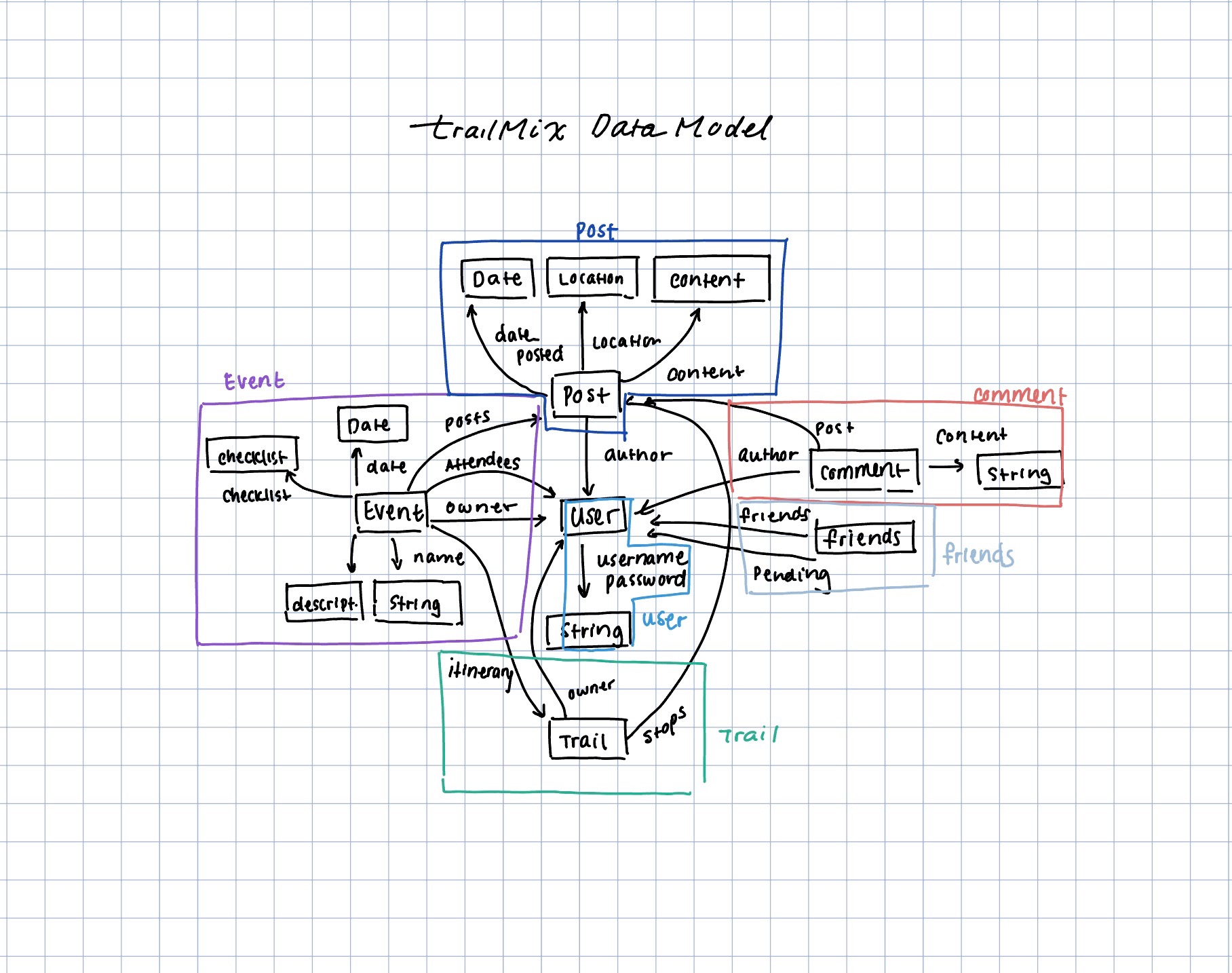A4. Backend Design
Data Modeling
I changed and removed some of my concepts to better fit the scope of future assignments
concept: User
state:
registered: set User
username, password: User -> one Stringconcept: User
state:
registered: set User
username, password: User -> one Stringconcept: Post [User]
state:
posts: set Post
id: Post → one string
author: Post → one User
content: Post → one Content
date_posted: Post → one Date
location: Post → one or no Locationconcept: Post [User]
state:
posts: set Post
id: Post → one string
author: Post → one User
content: Post → one Content
date_posted: Post → one Date
location: Post → one or no Locationconcept Event [User, Trail, Post]
state:
events: set Event
id: Event → string
owner: Event → one User
name: Event → one String
description: Event → one string
itinerary: Event → one Trail
date: Event → one Date
attendees: Event → set User
tags: Event → set String
checklist: Event → checklist (set string → number)
posts: Event → set Postconcept Event [User, Trail, Post]
state:
events: set Event
id: Event → string
owner: Event → one User
name: Event → one String
description: Event → one string
itinerary: Event → one Trail
date: Event → one Date
attendees: Event → set User
tags: Event → set String
checklist: Event → checklist (set string → number)
posts: Event → set Postconcept: Trail [User, Post]
state:
trails: set Trail
owner: Trail → one User
stops: Trail → set (Location → Post)concept: Trail [User, Post]
state:
trails: set Trail
owner: Trail → one User
stops: Trail → set (Location → Post)concept: Comment [Post, User]
state:
comment: set Comment
author: Comment -> one User
post: Comment -> one Post
content: Comment -> one Stringconcept: Comment [Post, User]
state:
comment: set Comment
author: Comment -> one User
post: Comment -> one Post
content: Comment -> one Stringconcept: Friend [User]
state:
friends: User -> set User
pending: User -> set Userconcept: Friend [User]
state:
friends: User -> set User
pending: User -> set UserApp Definition
app trailMix
include
User
Post [User]
Event [User, Trail, Post]
Trail [User, Post]
Comment [Post, User]
Friend [User]app trailMix
include
User
Post [User]
Event [User, Trail, Post]
Trail [User, Post]
Comment [Post, User]
Friend [User]Data Model Diagram

Design Reflection
While working on my backend service, I also had to consider how to divide the work between the frontend and the backend. In my backend implementation I do not have data/format validation implemented for fields such as date and location. In my implementation of the frontend, I would give it control over how data is processed and formatted for the backend, though I think adding some data validation in the backend would be beneficial in terms of extra error proofing.
Another example is when I was implementing my register and create endpoint for the event concept. I wanted it such that a user that creates an event would automatically be registered for it. However, I was not sure if that should constitute 2 separate API calls which would be made in the frontend, one that would create the event and one that would register the user for it right after or if it should all be included in 1 api call. I decided to go with the latter since a user should always be attending an event they create but I am currently still grappling with the decision in terms of its tradeoffs and if that is a good design decision.
Also while implementing and revising my concepts, I removed my Map concept as it felt more like a UI instead of a functionality. The map is used throughout several instances of my app as a profile, a global/friend feed, and to display event information and discussions but the UI is a combination of the user, trail, post, and friend concept coming together instead of its own concept.
I also had to consider how to keep track of the dependencies among my concepts. I wasn't sure if I should have posts point to the events they belong to or have events point to all the posts within them. I decided to go with the latter as a post can exist on its own without an event and that it would make more sense in the hierarchy of information to load all the posts for an event given the event (ex: load all posts for an event when on the event page) and that adding an extra optional field to the post data scheme may prove confusing.